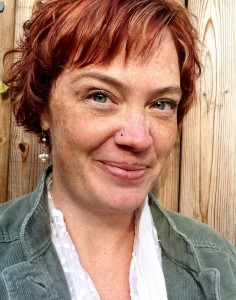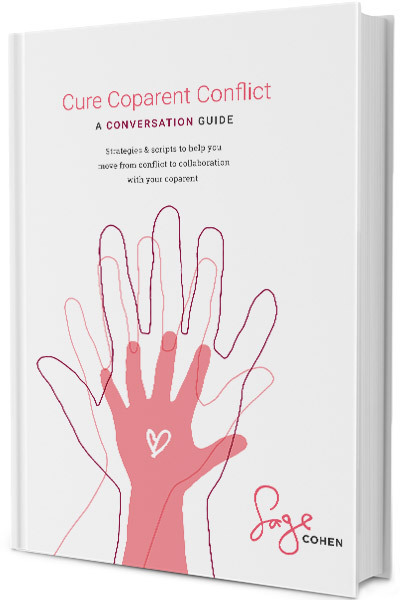 Carolee Bennett is a poet and artist whose work and spirit I have been admiring from across the country for many years now. She exudes life force, passion and wisdom. And she’s hilarious. That’s a lot to pack into one life. I am honored that she was willing to share her perspective on divorce with us here.
Carolee Bennett is a poet and artist whose work and spirit I have been admiring from across the country for many years now. She exudes life force, passion and wisdom. And she’s hilarious. That’s a lot to pack into one life. I am honored that she was willing to share her perspective on divorce with us here.
A pre-interview note from Carolee
My marriage has been over at least three years (I moved into the guest room in the fall of 2010), and I moved out of our house 2 1/2 years ago (August 2011). The timeline is important for this reason: it still feels strange to answer questions about marriage and divorce from a calm place… let alone a place of “knowing.” What I mean by that is it’s a chaotic and emotional subject, and it feels so strange to portray it as something a person can untangle from and assess. I’d hate to give the impression to those still in the thick of it — or going through a rough patch after it — that there’s anything wrong because they’re still confused or wild with emotion. (As my good friends told me: “I’d be worried if you weren’t confused or wild with emotion.”)
I am writing responses to these questions as someone who does feel stronger and wiser, but I still have periods of exasperation and sadness. In those periods, being divorced and being a single mom is still overwhelming. I started dating my ex when I was 19, and I was 41 before the divorce was final. I was “with” him longer in my life than I wasn’t, and what’s proven most difficult is figuring out how to know myself as myself, as a woman in the world, so to speak. These answers don’t mean that I’ve figured it out: no, no, no. They just mean I’ve picked up a few things along the way. 😉
1. How did you know your marriage was over?
There wasn’t one precise moment I knew it was over. There were several moments (some of them going back nearly a decade) where I knew something was wrong terribly wrong with the relationship. The details feel incredibly private (I only write about them sideways even on my own blog), but those moments often related to my identity as a mother, my ability to pursue poetry, my grief over losing my mother and control over my own body. We developed different parenting styles and had different expectations for the household. We stopped wanting to be in the same room. We failed at couple’s counseling.
Even with all that, there wasn’t a single “straw that broke the camel’s back” moment. However, there were two very bright and loud moments when I allowed myself to believe that it was over. First, a friend sent me a “Dear Sugar” column, Rumpus Advice Column #77, that explained how “wanting to leave is enough.” In it, Sugar (whom we now know as Cheryl Strayed) said, “Go, even though you once said you would stay. Go, even though you’re afraid of being alone. … Go, even though you don’t know exactly why you can’t stay. Go, because you want to.” I had examined all the reasons for leaving, and I worried that they weren’t good enough. Sugar’s refrain — “Go even though” — became a mantra, a way of giving myself permission. When I met Cheryl last summer at my MFA residency, that’s how I had her sign my copy of Tiny Beautiful Things.
The second moment I allowed myself to believe it was over came just weeks later: I found an itty bitty place — with just the right mojo — to live downtown. I had been sneaking out to look at apartments for a couple months, and finding “the” one was an extremely powerful moment. Saying “I’ve signed a lease” is much more certain that “I’m going to leave.” People threaten it all the time, and I’d said it many times prior as a warning. But my name on the contract for my own place? It was concrete.
2. How did the needs of your children impact your decision to divorce, and/or your experience of divorce?
I based my decision to separate and divorce on the certainty that our household was already broken and on faith that I could be a better parent for my boys without my ex. I told myself I was doing it for them as much as I was doing it for me. Two terribly unhappy parents make for an incredibly tense — almost locked-down — household. I told myself if I was happier and their dad was happier, then they would have a happier life.
Of course, I also understood what was at risk: if I failed to be a better parent on the other side, it will all have been for nothing. So it wasn’t an option for me go from a broken household and “be” (or act or feel) broken in the new household. And it wasn’t an option for me bring the stresses and bad habits from “the marital residence” (as it’s called in the legal paperwork) into the new space. This was first an expectation I set on myself: I would not give my kids any idea that I felt damaged or destroyed. There would be no melodrama over it that they would ever see. They saw my sadness sometimes, of course (they needed to see it was OK to express emotions about the loss of our family as we’d known it), but never, ever would they get the sense from me that there was anything wrong with me or their father or them.
And second, refusing to make a second “broken” household was an expectation I placed on all of us, including my sons. They would help build the experience. If something — like a breakfast routine — made everyone fight in the morning before school, then we abandoned the way we’d always done it and tried something new. If there were negative ways of treating each other that had carried over from the old environment, we identified them as unacceptable. Unknowingly, we created several mantras, like “we are kind and generous here” and ” we give people second chances.”
3. What inner resources / strength / courage did you discover through your divorce process?
I felt not at all strong during the time leading up to my leaving, during the separation, during the divorce process. Only looking back do I say, “Holy shit — Look at what I managed!” It’s hard to feel strong when you spend so much time sobbing, convulsing, dripping snot, etc. on the couches of your friends for months and months and months. So the things I called upon during the whole period weren’t things I was aware of at the time.
For example, I have always been a truth-teller (it’s some of where the poetry comes into play, right?). So often in my life, telling the truth created conflict, and even in the marriage, telling the truth about how it wasn’t working can seem the “bad” thing instead of the problems being spoken about. Over the years, my sense of who I was became at risk because my ex’s truth was so different than mine, and due to some imbalances in our relationship (for example, he was the “stable” one, and I was the “crazy” one), I’d learned to substitute his truth for mine. I started becoming someone else’s version of myself. I apologize if it sounds ridiculously new age, but I can assure you it wasn’t some transcendental quest. I did not upset my entire family over an “I’m going to go looking for myself” impulse. The discrepancies were serious, and the pain from it was going to take me away from my kids: either because it would kill me or because I’d have to run far away to escape it. I have no doubt about that.
So I can see now (again, always in retrospect) that going through divorce was my way of saying “no” to him, finally, and in a very big way, a way that was undeniable. Truth — my truth — was my biggest resource. It didn’t have to be the same as his. It just meant we couldn’t be together. (Isn’t it interesting how it’s connected with the themes in that “Dear Sugar” column, right? “Go even though.”)
In the back of my mind was also a certain sense of urgency: my mom died in 2009 at the age of 56. One of my fears became dying at the age of 56, and, I asked myself, if I had less than two decades to live, did I want to spend them miserable? No, of course not. My desire to be happy ultimately became less about fear of an early death and more about happiness for its own sake, but my mother’s death did lead to asking myself tough questions and facing the answers.
4. How has your divorce contributed to the healing / learning / evolution of you, your children, your family?
My kids have come a long way in accepting how much things have changed, but I don’t think we’ll know for a long, long time if they’ve experienced any type of healing. I do think that when they first faced the reality of two households, they lost some trust for both their parents. They told me many times they hated the choice we’d made and that me and their father better just work it out and put it back the way it was. Now, I think they trust us again as parents. I’m sure they wish it hadn’t happened, but they do know now that we love them and that we can still keep them happy and safe.
The most powerful evolution for me is related to my kids, though it’s not anything that they’ll have any direct experience of. Through the separation and divorce, I found myself as a mother. Within the marriage, I’d learned to believe I had no parenting instinct and little attachment. I’d learned to believe that I just wasn’t good at mothering, that maybe “mother” wasn’t who I was, that “good” parenting probably wasn’t even anything I could learn. Can you imagine if I hadn’t figured out otherwise? Can you imagine if I kept believing it and never had real relationships with my kids? I tear up when I even think it. My boys and I are so close now. We have wonderful relationships. I am a really good mom, mistakes and all. It would have been tragic if this was never allowed to materialize. I continue to be amazed at how the bonds evolve AND what a strong guiding force that mama bear instinct is. I do like to think it was quietly at work in the clunky truth that pulling me out of the marriage to begin with, but I couldn’t hear it then. Oh, boy — can I hear it now!
5. Have there been any surprising gifts for you and your children on the other side of divorce?
On this side of divorce, I would have to say that the surprise is that it actually works. The new household isn’t “less than” the old one. It’s not something we’re settling for. We’re actively creating the life we want. We have a hand in our own happiness.
6. What is the strategy / attitude / approach that has served you best while divorcing or co-parenting?
I hope I don’t throw a monkey wrench in the concept for this blog, Sage, but co-parenting in the collaborative sense isn’t possible for my ex and me. We require two households for a reason — we have different parenting styles, different ideas about discipline, etc. And remember that we don’t necessarily trust (or even value) each others approaches, philosophies, truths, etc. So! Trying to co-parent in the true sense of working together required too much tense, ummmm, “negotiation” and bogged us down too much with reminders about why we disliked each other. It became a distraction, actually, from the parenting. For better or worse (marriage pun not intended but I’m going to leave it), what we came to is that we only collaborate on the boys’ schedule and health/school issues. Our custody arrangement is 50-50 and so the schedule is quite fluid. With three boys in sports, band and other activities, it’s also quite demanding. We consider it an accomplishment that we’re able to coordinate it from two households (praise Google calendar!), and we accept that for us rising above our conflict means helping each other with the schedule and sitting together at school events so the boys don’t have to choose who to sit with. We (try to) keep it simple. For us, it avoids the contention that can be harmful to the kids.
In terms of a strategy for divorce, I don’t know that I had one. I feel like I put my head down and plowed through it. However, my middle son plays hockey, and I have heard a quote attributed to Wayne Gretzky, something about “skate where the puck is going, not where it’s been.” I’d like to think I took that approach; it certainly captures how I feel about it now. I had an idea about where I wanted to go and what I wanted for my boys. I still have an idea about how we are going to live our lives — and it’s got nothing to do with what happened to my marriage (where we’ve been). It frees me from looking back too much and from worrying too much about blame and fault. It’s about having no regrets. I have no regrets.
7. How has your divorce influenced your work?
Well, I’m quite sure now that I quoted Gretzy, they’re going to revoke my poetry pass! But seriously, my separation/divorce actually caused a significant interruption to my writing. In addition to the energy required to handle all the emotions, I returned to work full-time and started a new household from scratch. I had no time or energy for anything except my boys, my 9-to-5 and the cooking, cleaning, etc. I also slept a lot. I wrote nearly not at all, and I was really pissed about it. When I did write, I became irritated when it became about my ex or the marriage or the divorce. I resented its infiltration into everything. In the years prior, I’d used the struggles of the relationship in the poems all the time, but now I wanted none of that. I didn’t know — kind of like my early attempts at dating! — exactly what I wanted. I still had the impulse to write, but I felt blocked… and this is coming from someone who doesn’t believe in writer’s block. I just didn’t know what was next… if I wasn’t going to write about the marriage, what would I write about?
Of course (duh), I was making two classic blunders: telling myself NOT to write about subject A and telling myself I needed to know what subject B was before I could write. I knew better, but I was exhausted. Things were blurry. I knew I was coming out of it when I started taking photographs again. I still told myself that I didn’t have any words, but I was picking up my camera (and my iPhone camera) more and more. It was a sign I was paying attention to detail again; I was opening back up.
So I did what any (in)sane girl would do: I started taking graduate classes in poetry! Already, in fact, I’m more than half-way through an MFA program. And that’s were I am now… writing about whatever I want in a strong voice that I recognize and trust, even when the writing wants to be about divorce.
Carolee Bennett is an artist and poet who lives in Albany, NY, with her three sons. Her poetry has been published in a number of print and online journals, and she is pursuing an MFA in poetry through Ashland University in Ohio. Carolee blogs at www.gooduniversenextdoor.com.
Share this Post


4 Comments on “Interview: Carolee Bennett”
This interview gets me down to the bone. The gravity and hopefulness of “truth” being Carolee’s strongest resource — isn’t this tremendous courage? I get a bit emotional thinking about it. And though I’m not going through a divorce, I’m going through a change that requires day to day and minute by minute cognitive work. Thank you for the inspiration and strength of this interview. Brilliant.
Pingback: why i said “no” to the new york times & “yes” to the albany times union | good universe next door
I think that this should be a “must read” for anyone going through separation and divorce. There is “Hope”
Thank you Carolee for the “Truth”
Craig, I absolutely agree. I feel so fortunate to have access to Carolee’s fierce wisdom.